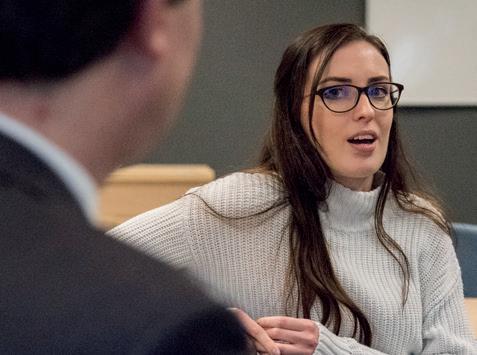
4 minute read
STRENGTH IN NUMBERS
SPOTLIGHT ON SUZANNE CARRIE AND THE UNIVERSITY OF WEST ENGLAND
SUZANNE CARRIE IS HEAD OF EQUALITY, DIVERSITY AND INCLUSIVITY AT THE UNIVERSITY OF WEST ENGLAND (UWE). SHE IS COMMITTED TO HELPING YOUNG PEOPLE PROGRESS INTO HIGHER EDUCATION FROM ALL BACKGROUNDS. HERE SHE EXPLAINS THE NEW COLLABORATIONS SHE HAS HELPED THE UNIVERSITY FORM AND HOW THEY ARE HELPING YOUNG PEOPLE ACROSS THE REGION DEVELOP SKILLS TO HELP THEM IN BOTH EDUCATION AND LIFE.
Q// There’s so much that UWE does to make sure that your doors are open to the widest possible group of young people. Tell us why this matters so much.
A// I think social mobility really matters at UWE because it’s something that has personally affected the lives of a lot of our staff and students; and because we are really part of the city region. We really are a local university with an international reach. We’ve been working in collaboration with others in the city to widen access to higher education and make sure we’re supporting students and trying to close any gaps.
Four years ago, we had the opportunity to form a partnership with all of the higher education providers in the region. That was funded through the government, fundamentally, but also through the Office for Students, which is the higher education regulator. The aim of that was to address the fact that there are still gaps in the rate of people going to higher education in different areas. You’re going to see some stuff in the media about people saying ‘we shouldn’t be aiming for 50 per cent of people to go to higher education’. I’m not really interested in that overall figure, I’m interested in the difference geographically, the fact that there are some areas of Bristol where 100 percent of 18 year olds go to university. There are other areas where 10 per cent do. That difference can’t be fair on anyone and that really matters to UWE. We felt that there are some areas of Bristol where there’s persistently low rates of participation in higher education. This hasn’t really changed enough over the past 10 years, despite a lot of work going on. Often there ends up being lots of small groups competing with each other. We saw this funding package as an opportunity for the two universities, UWE and the University of Bristol, and the two other colleges that offer higher education options within the city - City of Bristol college and SGS College – to join up; and to work with charities who offer brilliant provision and can really provide opportunities for young people.
So it wasn’t just every individual activity had to transform someone’s life chances because frankly, none of them individually are going to do that. But overall, if there’s a whole package and it fits together in a way that makes sense, we all might have a chance of achieving what we’re trying to do.
Q// How do you feel about the partnerships you have brought in and what sort of impact are we now seeing from this?
A// It’s not easy to work collaboratively when there’s genuine competition at times. But I think it is having an impact. Schools at the moment are so overwhelmed with trying to deal with Covid-19 and the restrictions and catch up and all the rest of it. In Bristol, at the time of writing, we’ve seen a significant increase in cases and that has had a huge impact on schools. Despite that, we have schools engaging with us regularly and wanting to book in activities and use our materials, supporting their young people in thinking about their futures.

Q// Tell us a little bit about the activities of Future Quest (the Bristol partnership of universities and colleges, working with the local authorities, the combined authority, employers and other organisations).
A// Some of the activities are based on a model of having high expectations. So there are activities that are about helping people to think about their goals. We have weaved careers guidance and advice into those activities. A lot of what the schools are looking for at the moment is helping young people to think about resilience, mental health and how to stay focused on education when things are tough. We have provided opportunities in the past for people to come to university and understand what it’s really like to be a student, to meet students, to have taster sessions of different subjects, what it’s like to study in a university setting.
Q// How powerful are these sorts of activities for young people?
A// It’s really powerful. There was a brilliant story where a group of young people went to visit the Houses of Parliament and met their MP who said to them, ‘is there anything that I can do anything that would make your life better?’ And they said, ‘well actually, you know, what, the toilets in our school are really awful’ - and they talked to him about it. They were so convincing and clear on what they wanted that the MP wrote a letter to the school saying, ‘I was really impressed by the young people from your school, but I really want to understand what you’re going to do to improve the toilet facilities’. The school then contacted us to say thanks for supporting young people to make such a strong case. But they were so impressed that they were able to bring about that kind of change. Before going to London, they’d done a lot of work on confidence, public speaking and making a case for the kinds of skills that you need to succeed in school and university.










